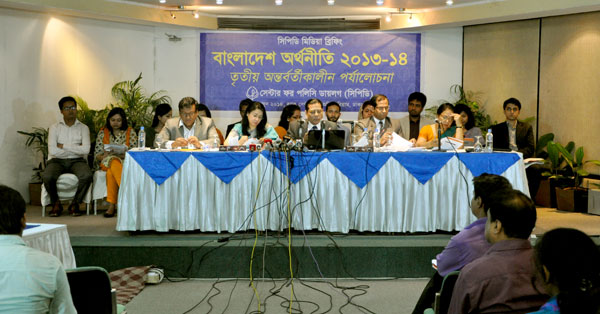Political uncertainties have adversely affected Bangladesh’s economic performance, particularly private sector investment which undermined the prospects of accelerating GDP growth.
On the other hand, relative macroeconomic stability in the backdrop of contained inflation, sustained exchange rates, high foreign exchange reserves and high export earnings has translated into higher economic growth despite persistent structural weakness, malfunctioning institutions and political uncertainties.
An enabling political environment through inclusive and participatory political culture will be key to regain investors’ confidence while institutional strengthening, targeted reforms, good governance at all levels and desired budgetary measures are required to achieve sustained growth momentum.

The recommendations emerged from the CPD study “State of the Bangladesh Economy in FY2014 (Third Reading)” by the CPD-IRBD (Independent Review of Bangladesh’s Development) team which conducts periodical analysis of the state of the Bangladesh economy.
On behalf of the team, Professor Mustafizur Rahman, Executive Director, CPD presented salient features of the study to the media, covering FY2014 macroeconomic scenario, public expenditure financing, sustainable power sector development and export sector performance, at Brac Centre Inn, on Sunday, 1 June 2014.
[box title=”Resources” color=”#333333″]State of the Bangladesh Economy in Fiscal Year 2014 (Third Reading)
Presentation on the IRBD review
Press reports and Editorials on the event
[/box]According to analyses, the economy during the first half of FY2014 was confronted with severe disruption in production, transport and service delivery and deceleration in the investment growth; while in the second half, uncertainties were compounded by the non-participatory National Election in early January this year.
In the above backdrop, major challenges for the government include reinvigorating the investment environment, and also financing public expenditure, particularly if the existing trend of revenue collection and foreign aid disbursement remain unchanged.
Government also needs to pay attention to prioritising foreign aid over domestic resources for deficit financing; and devising ways to resolve emerging issues such as negative growth of remittance and lacklustre performance of non-RMG sectors.
The IRBD review came up with suggestion for cost-effective and efficient strategy for power generation keeping in mind rising requirement and resource constraints.
CPD senior researchers maintained that non-economic factors such as good governance, strengthening institutions and local government, conducive political environment are key drivers for Bangladesh to become a middle income country by 2021.
With Professor Rahman, CPD Research Director Dr Fahmida Khatun, Additional Research Director Dr Khondaker Golam Moazzem and Research Fellow Mr Towfiqul Islam Khan responded to a number of queries from journalists in the Q&A session.

